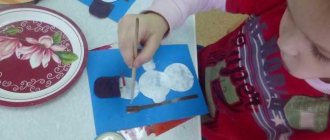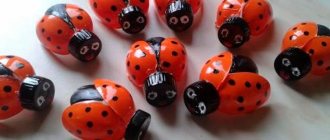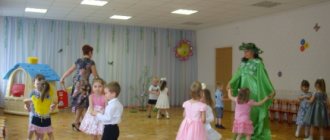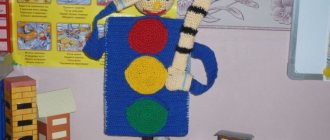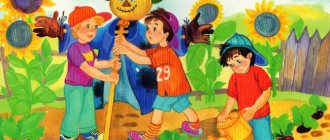This teaching material on the topic “Musical Summer” was created with the aim of organizing leisure time for preschoolers in the summer, and to involve children in organizing and conducting thematic events.
Summer is rich in calendar and folk holidays, such as Russia Day, Family Day, Love and Fidelity, and industry professional holidays. Pupils learn a lot of new and interesting things over the summer period. Expanding children's horizons through play has a beneficial effect on the child's development and adaptation and shapes the preschooler's understanding of society and the world around him.
More details about the material:
In summer, all continuous educational activities in kindergarten take place in the fresh air.
There are many activities for preschoolers: entertainment, game programs, quizzes, puppet and theatrical performances. The developed project for holding events in preschool educational institutions in the summer is designed for the artistic and aesthetic development of children, strengthening physical, mental and social health, and developing their cognitive, communicative, and creative abilities.
Project type: creative, communicative and educational.
Implementation timeframe: medium duration (3 months: June - July - August). Project participants: music director, group teachers, children (all groups). Children's age: 3–6 years.
Goal: To develop creative abilities in the summer based on diverse activities.
Tasks:
- To interest preschoolers in the uptake of cognitive, artistic and creative activities;
- cultivate an emotionally positive attitude towards entertainment and holidays, create an atmosphere of joy;
- develop emotional sensitivity, emotional response to musical works, the beauty of the surrounding world, works of art.
- Develop interest in various types of visual activities;
- develop musical abilities: hearing, memory, rhythm, musical taste;
- promote children's health;
- develop motor, mental, intellectual, creative abilities of pupils in a variety of activities;
- to form a positive emotional state of all participants in the educational process;
- ensure integrative activities of children, preschool teachers, parents and large families.
- Cultivate interest in the sound world.
- Feeling empathy for the characters.
- Develop observation and ingenuity.
- Instill artistic and aesthetic taste through classical music.
Relevance of the project. The project offers ample opportunities for the artistic and aesthetic development of children, strengthening physical, mental and social health, and developing their cognitive, communicative, and creative abilities.
Expected results:
For children: expanding ideas about summer based on artistic, aesthetic and musical activities.
For teachers: introduction of innovative technologies in working with children, personal and professional growth.
For parents: awareness of their need and importance in the educational activities of the kindergarten in the development of children according to the Federal State Educational Standard in five areas (cognitive development, speech development, social and communicative development, physical development, artistic and aesthetic development)
Stages of work on the “Musical Summer” project
1st stage (preparatory):
Identification of a problem situation: how to interest and captivate children in the summer in kindergarten?
Stage 2 (project development)
Drawing up a calendar-thematic plan for “Artistic and Aesthetic Development”, type of activity “Music” and developing joint activities with children and teachers. Preparation of entertainment: “Russia Day”, “Mushroom Week”, “City Week”, “Family Week”, “Cautious Pedestrian”, “Creativity Week”, “Dance Week”.
Preparation of musical and didactic games for the entertainment of preschoolers; preparation of a musical presentation on the topic “Shchyolkovo is my hometown” using ICT tools; preparation of a presentation “Riddles about the seasons”; writing entertainment scripts and the final event “Talent Festival”; selection of materials and equipment, various games and other activities (drawing on asphalt).
Selection of songs, musical games, dance compositions related to the theme of the project:
Stage 3 (project implementation)
Activities with children:
1. Conversations about summer as a season, learning poems (teachers): T. Bokov “Hello, summer!”; V. Stepanov “Hello, forest!”; I. Surikov “Summer”; S. Marshak “Green Page”; M. Moravskaya “Two Beetles”; A. Usachev “Ladybug”; O. Kuznetsova “Bumblebee”; M. Petrova “Grasshoppers... Who are they”; A. Fet “Butterfly”.
2. Repetition of children's songs, round dances, dances, musical games at the choice of the music director, for example:
Round dance “We went to the meadow”, music by A. Fillipenko; “I have an aunt” dance; “The deer has a big house” - game; “Let’s go through the raspberries to the garden”, music by A. Fillipenko; “A grasshopper sat in the grass ", music by V. Shainsky; "Song of the Lion Cub and the Turtle", music by V. Shainsky; "The Happiest", music by Y. Chichkov.
3. Acquaintance with classical musical works in which the composer depicts summer through musical means: P. I. Tchaikovsky. Cycle of pieces for piano “The Seasons” by E. Grieg. Piano piece “Butterfly” by A. Vivaldi. Suite “Seasons” (“Summer”).
4. Acquaintance with works of fine art “Summer in the paintings of Russian artists of the Wanderers” using a multimedia projector, screen (music director, teachers): I. Levitan “Birch Grove”; A. Plastov “Haymaking”; I. Shishkin “Rye”; F. Vasiliev “Wet Meadow”; V. Polenov “Overgrown Pond”; A. Vasnetsov “Motherland”; I. Shishkin “Morning in a Pine Forest”; I. Levitan “At the Pool”; I. Repin “Summer Landscape”.
5. Learning dances at the choice of the music director, for example: “White Birds”, “Childhood” songs “My Russia”; “Red, White, Blue”; “The World is Like a Colored Meadow”, “Kalinka” (with spoons).
6. Conducting outdoor dance games and flash mobs: “Sun and Rain”; “Blue Car”; “Song about Summer”; “My Family”; “City of Childhood” (flash mob).
7. Carrying out games: “Who will collect the most flowers?”; “Boys - girls”; “Where did the butterfly fly?”, “Butterflies and flowers”, “Collect the Chamomile”.
Plan of events during the summer recreational period of the 2018-2019 academic year.
| event title | Dates | Expected result | Responsible |
| 1.Russian Independence Day (Fig. 2, 5) | June 11 | Cultivate love for the homeland. Create a joyful mood | Musical director Puryskina A.S. Educators Sargsyan L.A. Voronkova N.A., Zinovieva L.A. |
| 2.Fun with group balloons | 21st of June | Intensify children's recreation. Consolidate the knowledge acquired in music classes. | Musical director Puryskina A.S. Teacher Sargsyan L.A. |
| 3. Fun on the street Soap bubble festival Senior age | June 28 | Develop the ability to rejoice with friends. To promote the accumulation of knowledge of modern dances and games. Develop the ability to expressively perform previously learned songs | Musical director Puryskina A.S. Educators Sargsyan L.A. Voronkova N.A., Zinovieva L.A. |
| 4. Entertainment “The radiant sun come to us” | 5'th of July | Bring joy and pleasure from entertainment. Activate the perception of music and movements in musical games and dances. | Musical director Puryskina A.S. |
| 5. Leisure activity “Day of Family, Love and Fidelity” (Fig.  | July 8 | Organize fun leisure time for children, develop children's knowledge about family and home. Encourage the child to perform songs learned during the year, to realize their abilities in dancing and musical games. | Musical director Puryskina A.S. Educators Sargsyan L.A. Voronkova N.A., Zinovieva L.A. Dzhumakhmedova O.S. |
| 6. Entertainment “Follow the safety rules healthy, grow strong” (Fig. 3) | July 18 | Organize fun leisure time for children, develop children's knowledge of correct behavior on the road and at home. Encourage the child to perform songs learned during the year, to realize their abilities in dancing and musical games. | Musical director Puryskina A.S. Educators Sargsyan L.A. Zinovieva L.A. |
| 7. Theatrical performance “How the sun collected rays” (Fig. 4,7) | August 9 | Organize fun activities for children. Encourage the child to perform songs learned during the year, to realize their abilities in dancing and musical games. | Musical director Puryskina A.S. Educator Shadrina T.A |
| 8. Fun on the street. Dance Festival 2019 (Fig. 6) | August 15 | Intensify children's recreation. Encourage the child to realize his abilities in dancing and musical games | Musical director Puryskina A.S. |
| 9. Entertainment “Happy Journey” (Fig. 1) | July 22 | Create a joyful mood. Activate the perception of music and movements in musical games and dances. | Musical director Puryskina A.S. Teachers Shadrina T.A., Krivoruchko I.Yu. Zabolotnova M.F., Shekhovtsova N.N. |
| 10. Game - quiz “My Favorite City” | July 11 | Consolidate knowledge about your hometown. Foster a sense of pride in your city. Develop a desire to explore your native land. Bring children joy and pleasure through songs and games. | Musical director Puryskina A.S. Teachers Shadrina T.A., Krivoruchko I.Yu. Zabolotnova M.F., Shekhovtsova N.N. |
Project results.
Saturating children's free time in the summer with a variety of musical, artistic, aesthetic, and cognitive activities.
Product of activity: Carrying out holidays and entertainment, talking about summer; about family; about the city. Scenario development; Photographic materials; Discussion of results with teachers; Children's impressions. photo report on the kindergarten website; presentation at the pedagogical council.
Bibliography
- A.I. Burenin "Rhythmic mosaic".
- S.I. Merzlyakov “The Magic World of Theater” (for children 5-7 years old).
- Magazines “Musical Director”: No. 1,3,4,5 – 2004, No. 1,4,6 – 2005, No. 4,5 2006, No. 1 – 2007.
- Long-term planning.
- O.P. Radynova. "Musical Masterpieces" Author's program and methodological recommendations. – M. 2004
- O.P. Radynova. A.I. Katinene. M.L. Palavandishvili. Musical education of preschool children. — M. 1999
- ON THE. Sorokin “Theater, creativity, children.”
Rice. 1 Entertainment “Fun Journey”
>
Rice. 2 Leisure “Russia Day”
Rice. 3 Entertainment “Follow the safety rules - grow up healthy and strong”
Fig. 4 Theatrical performance “How the sun collected rays”
Fig.5 Leisure activities “Russia Day”
Fig.6 Leisure “Dance Festival 2019”
Fig. 7 Theatrical performance “How the sun collected rays”
Fig.8 Leisure “Day of Family, Love and Fidelity”
If you liked the page, share it on social networks:
Report “Organization of musical leisure and entertainment in a preschool institution”
Report on the topic:
“Organization of musical leisure and entertainment in a preschool institution”
Organizing holiday matinees and musical leisure activities is an important part of the work of the kindergarten teaching staff. In their preparation and conduct, music is of decisive importance, as it colors the holiday with a variety of feelings, pleases, excites, and gives each child the opportunity to express his or her attitude towards it. In this regard, special requirements are imposed on the quality of the repertoire and the artistic word must fulfill an educational, educational and cultural-developmental role both in relation to a small child and the adult teachers and parents around him.
In the process of preparing for such holidays, children dance to music, play the roles of different characters in fairy tales, voiced by classical music, take part in creating decorations, compose their vocalizations based on the musical characteristics of the characters’ images, and play musical instruments. Parents, seeing with what pleasure their children “communicate” with musical classics, as a rule, themselves begin to show interest in these works, and real, eternally valuable music will sound in the family. Teachers, helping the music director prepare holiday matinees and entertainment, also replenish their musical and cultural baggage with new invaluable impressions.
Sounding fairy tales into music requires the painstaking work of a teacher. In order to find exactly those musical fragments that would correspond in character to the emotional state of the fairy tale characters, the music director of the kindergarten has to listen to many pieces of music.
Festive matinees and musical leisure activities in kindergarten can be held in the traditional form of a concert or theatrical performance. Children are interested in those types of holidays that include fairy tales soundtracked by music. For example, these are the tales of famous writers H.K. Andersen, or works, or works independently composed by our teachers. The success of any celebration depends on the music used. Recently, popular pop music has often been used during musical events, which has a negative impact on children. It is necessary to take into account that music. similar to speech, it is mastered by children from a very early age. What kind of musical “speech” children hear, they get used to it, mastering it as if it were their own.
In addition, a small child is constantly under the enormous influence of the adult raising him. A teacher, offering children primitive, entertaining pop music as educational material, forms certain negative preferences in children. After all, children, as a rule, hear such music in the family. It remains to be regretted that a child in preschool age will never meet a person capable of revealing the beauty of real music.
It is important to take into account one more point: the process of preparing for a holiday matinee or leisure activity should not turn into painful training, drilling and coaching for children. Experience shows that repeated repetitions of precisely fixed movements and long learning of the roles of literary works do not give children any joy. It is also good to use free rhythmic compositions that develop children's creativity and plastic movements.
Each fairy-tale character in the scenarios has its own musical characteristic. To make it interesting for children, when learning fairy tales it is good to change roles, trying their hand at each of them. I teach children to listen carefully to music, to find expressive movements, and characteristic images of literary characters. At the same time, each child plays different roles, feels like a full-fledged participant in the performance, and chooses the most attractive role for himself.
When preparing for the holiday, children can make decorations and draw fairy tale characters while listening to music. Children feel free, behave relaxed, emotional and spontaneous. This charge of freedom and the possibility of a creative approach to the role remains with them during the holiday, in the presence of spectators. The child is not afraid to make a mistake, do something wrong and receive a negative assessment from an adult, since each time all roles are performed with new versions of improvisation. Holidays are an indicator of the work of the music director, his creative report to the staff of the preschool institution, parents and, above all, to the children. Practice shows that holding festive events using works of musical classics makes them interesting, meaningful, and exciting for both children and parents. The educational effect of such matinees cannot be overestimated - it is enormous!
